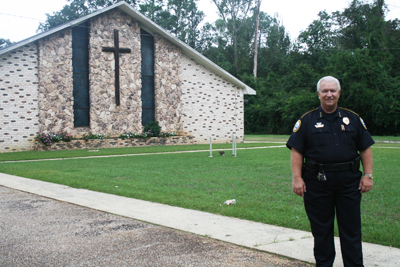
(RNS1-SEPT26) Mike Rowland, the police chief in Bay Minette, Ala., started Operation Restore Our Community that gives non-violent offenders the option to attend church or do jail time and pay fines. For use with RNS-CHURCH-JAIL, transmitted Sept. 26, 2011. RNS photo by Connie Baggett/Press-Register.
BAY MINETTE, Ala. (RNS) A new alternative sentencing program that offers first-time, nonviolent offenders a choice of a year in church or jail time and fines is drawing national attention, including fire from the American Civil Liberties Union.
“This policy is blatantly unconstitutional,” said Olivia Turner, executive director for the ACLU of Alabama. “It violates one basic tenet of the Constitution, namely that government can’t force participation in religious activity.”
But the local police chief who is heading up the week-old “Operation Restore Our Community” says no one is being forced to participate.
“Operation ROC resulted from meetings with church leaders,” Bay Minette Police Chief Mike Rowland said. “It was agreed by all the pastors that at the core of the crime problem was the erosion of family values and morals. We have children raising children and parents not instilling values in young people.”
Rowland said the idea was simple: get people who are not yet hardened criminals to become involved in positive programs. More than 100 local churches have some sort of program available, and 56 agreed to help monitor first-time, nonviolent offenders.
Under the program launched on Sept. 20, pastors would report weekly to the police chief, and offenders in the program would bring a signed sheet to prove they attended church.
Offenders would also have to answer some questions about the services, Rowland said. Those who voluntarily choose church over jail get to pick the churches they attend. If they complete a year’s attendance, Rowland said, their criminal case would be dismissed.
Rowland said the goal is to produce “productive citizens.”
Some critics say the program crosses the line between church and state, and say minority religious groups are shut out of the program because there are few mosques or synagogues in the area. Atheists, meanwhile, would have no option but to pick another alternative sentencing program, Rowland said.
Rowland said the Bay Minette ROC project is the only one of its kind in the country, but online searches show others have been tried. A similar program in London, Ky., drew headlines in 2004, and before that a judge in Lake Charles, La., was eventually suspended for ethics violations stemming from sentencing defendants to church, according to a Louisiana Supreme Court ruling in 1994.
“The biggest question or complaint we have had is about separation of church and state,” Rowland said. “Those issues won’t come to the forefront because the offenders are not being forced to attend church, and what religion they choose is really up to them. We even have provisions for people who are from out of town to choose a place to worship in their own communities.”
Rowland said he was doubtful, however, that an atheist would choose to participate in the ROC program, but would be able to choose community service or other options.
The ACLU is “considering options for response,” Turner said.
“There isn’t a real choice here,” she said. “This policy completely entangles government with religion, and is an abuse of power because it coerces people into religious exercise.”
(Connie Baggett writes for The Mobile Press-Register in Mobile, Ala.)




